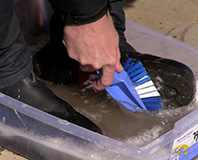
My parents worked both on their own farm and later on a commercial meat bird farm, both of which practiced different levels of biosecurity. Their experience gave me a great practical knowledge that I can share with you.
Commercial poultry sheds implement a very high level of biosecurity which even restricts vehicle access to reduce the introduction of new diseases onto the farm. Vehicle washing stations are also part of many of their facilities. But fundamentally at a shed level it means that the workers much change their clothes and wash their boots in a boot bath solution before entering and exiting every shed.
On a regular free range family farm, however, biosecurity rules are much less strict. But stricter rules may apply if an outbreak has been detected. Usually the isolation of a farm is enough. There is not a high level of traffic and visitors like in a commercial situation. Isolation sheds are still key to keeping poultry safe on a family farm.
So what does it mean when I come to your yard?
My first thought is always my footwear. Even when I come for a complimentary visit, I wash my shoes as soon as I get home. But when I visit your yard during a booking, I will always wear a pair of sturdy gum boots. At my car I take them off, place them in a bag and put on different shoes to drive home in.
As soon as I am home, the boots are scrubbed down in my laundry (never outside where my hens are), and then are soaked in a solution, scrubbed again and rinsed off and left to air dry in sun by the window.
My choice of boots are also very important. I always try to find low rise tread where soil contaminates have less places to harbour. Some boots have deep tread on the heel which makes cleaning a nightmare (see top picture).
My clothing is also important as the folds of pants legs can potentially carry bio-hazards to or from properties. So I use a uniform or a change of pants for every pet sitting job for the day. Since chickens might hop up onto my lap during a visit I take care to always change.
My equipment always gets a good soapy scrub between visits, too. And again, it is never done outside but in my laundry to keep any contaminates from being spread.
My hands are very important in keeping not only the pets healthy but myself as well.
During a clean out of water drinkers I wear disposable gloves to ensure that containers are properly clean. After the waterers are attended to, the manures are then removed from the coop in a light general clean. The gloves are then disposed of before exiting your property. Keeping contiminates on the property is safer than removing it to another location off site whenever possible. If I do take them with me, it will be in a zip lock bag that will be disposed of at home.
Other ways to use Biosecurity
Buying new poultry
Whenever you bring more poultry onto your property there should be at least 3 to 4 weeks of quarantine. This means keeping them on your property BUT in isolation from the other poultry with the widest distance possible. As backyards grow smaller, the options become more limited but still achievable. By fencing off around a coop run by 1-2 feet, this will keep the birds from being able to touch one another through the wire. The greater the separation, the greater the biosecurity. Many airborne respiratory diseases can travel a great distance, so this is why it is so important.
If you do not have a second coop, then use either a large dog cage or pop-up pet tent under the veranda or in the carport.
What to look for:
- Respiratory issues - sneezing, nasal discharge, crackly full chest sound
- Mucus or blood discharge from any part of the body
- Lice, mites and fleas
- Dirty bottom - caked on manure can be a sign of worms or gut issues
- General malaise - eyes closed, hunch, fluffed up, pale comb, reluctant to walk or eat, etc.
- Diarrhea, blood or worms in droppings
- Swellings or lesions about the face
Show Time
If you plan on taking your poultry to shows it is important to remember that they will be in close proximity to other poultry who may have health issues that went undiagnosed. And you need to assume the same for your poultry, too.
Two weeks before a show, isolate your chosen birds from the main flock.
Monitor them for all health issues as well as for show pampering.
Two weeks after a show, keep your birds in isolation and monitor for any new introduced issues.
This is the safest way to keep your flock safe and healthy.
Just remember that these periods of isolation for showing may disrupt the pecking order slightly.
This info is thanks to: https://www.agric.wa.gov.au/livestock-biosecurity/poultry-biosecurity-checklist-small-landholders
On your Property
- Inspect poultry daily and isolate birds at the first signs of illness.
- Report unusual signs of illness to a veterinarian or ring the Emergency Animal Disease Watch hotline on 1800 675 888.
- Discuss vaccination of poultry with a veterinarian as it is a specialised task.
- Do not allow other animals, especially wild birds, to have contact with your poultry. Use good shed design, fencing and hygienic feeding practices to keep wild birds separate from your poultry.
- Do not allow poultry to have access to water used by wild waterbirds.
- Ensure poultry feed and water sources cannot be contaminated by waterbirds or other animals, pests and rodents.
- Chlorinate water from dams or rivers before giving to poultry. Test bore water for suitability for use with poultry.
- Make sure your hands, clothes and footwear are clean before having contact with poultry.
- Limit visitors to your birds. Ensure visitors to your poultry wear clean clothes and shoes, have clean hands and have not had contact with other poultry on the same day.
- Keep your equipment and poultry enclosures clean.
- Do not share equipment with other poultry owners, unless it has been thoroughly disinfected.
Moving poultry onto/off your property
- Check the health of your poultry before transporting them off your property.
- Do not move sick animals to a show/gathering on another property.
- While at an event, use only your own feed and water containers.
- Where possible, avoid handling other exhibitors' birds. If you do handle other birds, wash your hands thoroughly afterwards.
- Clean and disinfect vehicles, cages and other equipment before leaving and returning to your property.
- Clean all clothing before returning home after an event.
- Check the health of your poultry before returning home from an event.
- Isolate and observe poultry returning from events for 14 days. Call a veterinarian if you see any signs of illness.
A chicken hotel (boarding coop) situation flies in the face of good biosecurity of which I am an avid supporter of. I care about disease and pest management of all of my clients pets because I know that it will in turn affect my own pets if I were not careful enough.
It is far better for your birds of every kind to be kept in their own home environment not only for their health sake but also for their comfort of familiar surroundings and their type of food to keep up their good laying habits.
Minimising their stress is also vital to good health. I love to see how every backyard is different and how flocks thrive in their home environments. You can rest assured that I value your pets as much as you do.
This is just another important part of what it means to book with Adelaide Chicken Sitting Service. Home call out support.

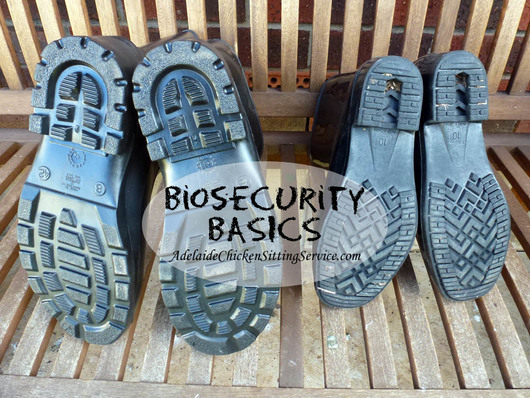
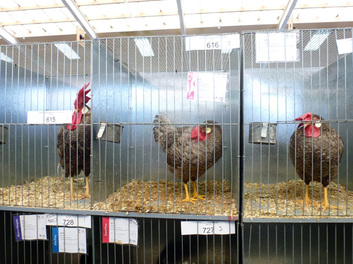
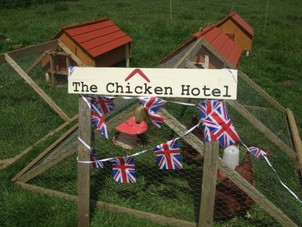
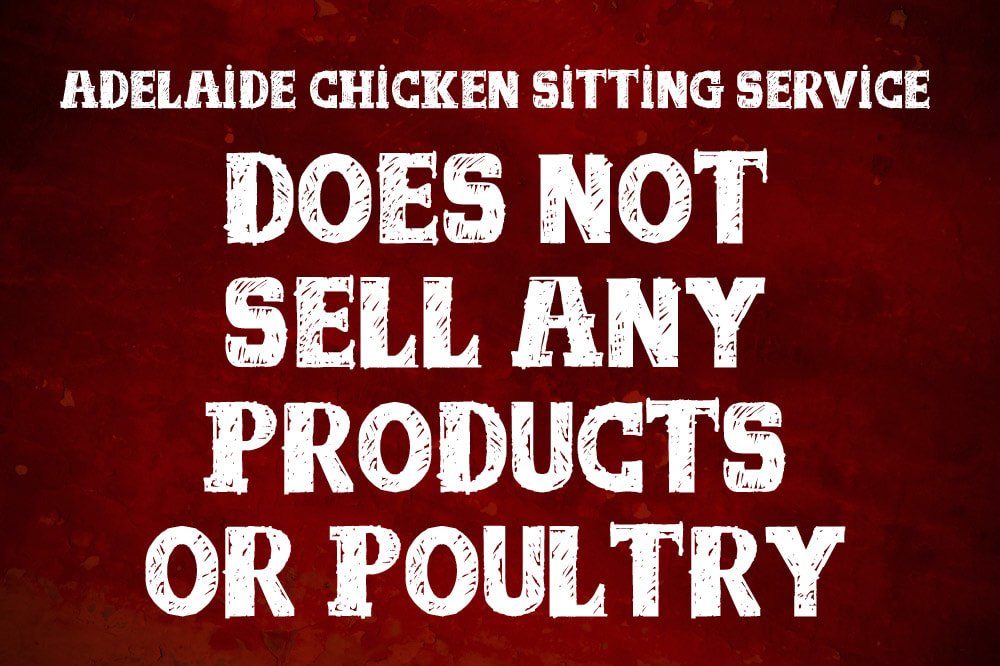
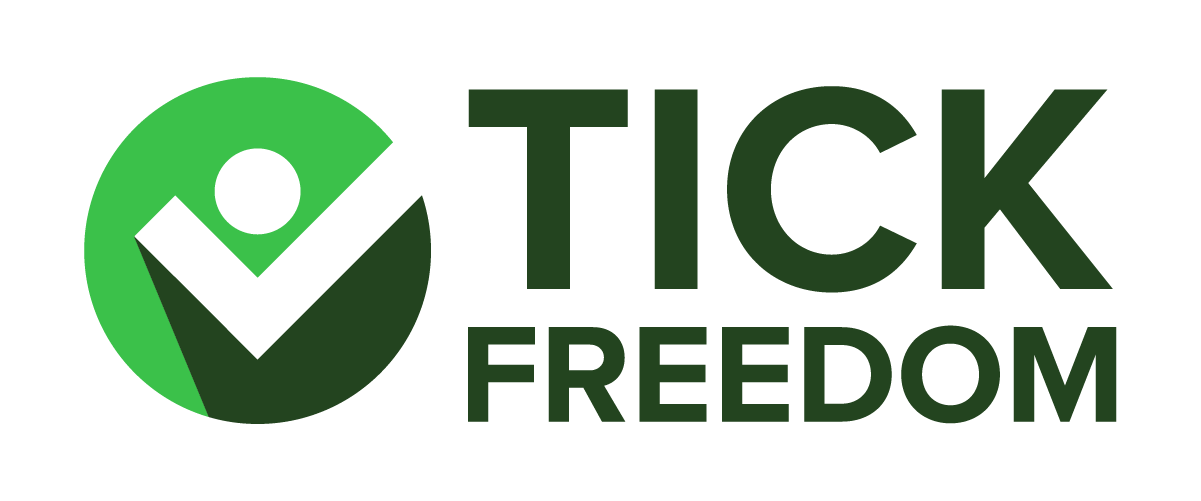
 RSS Feed
RSS Feed